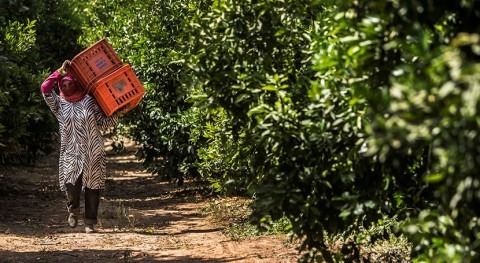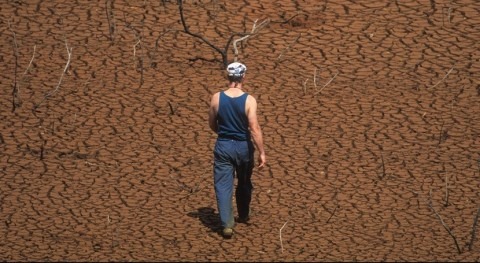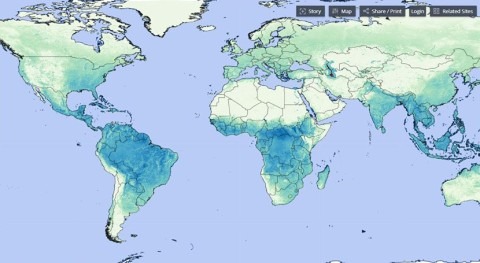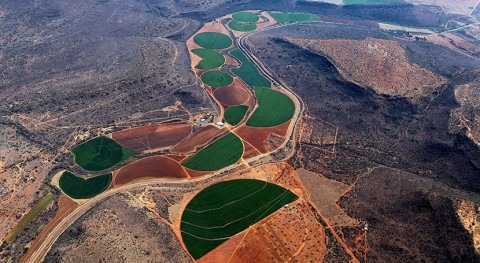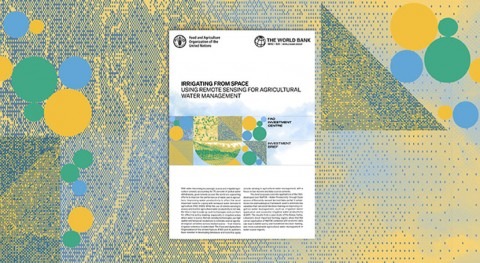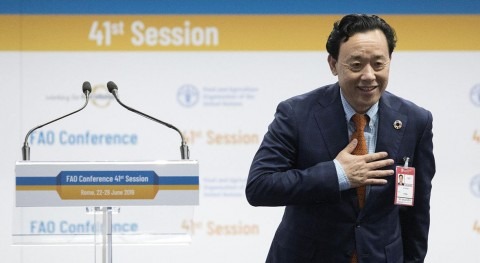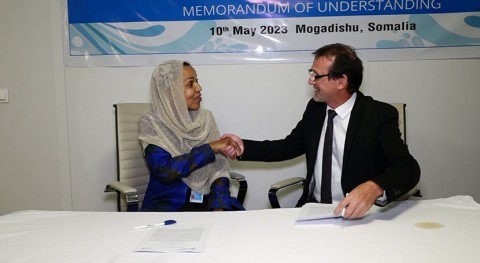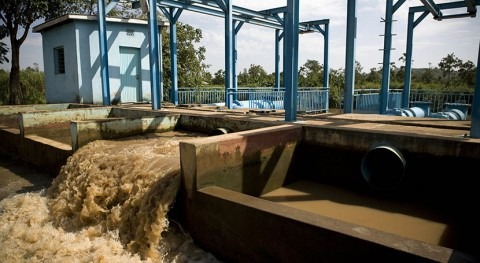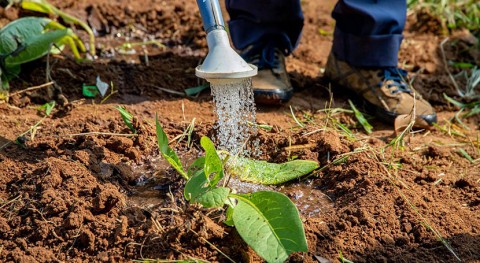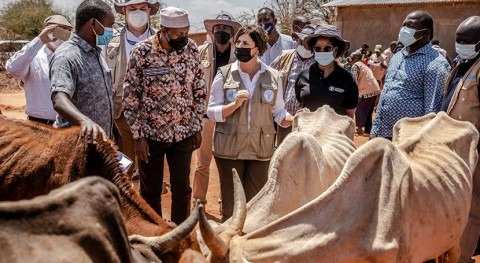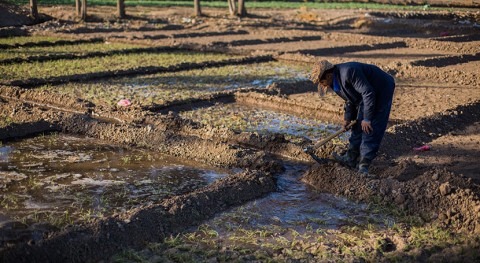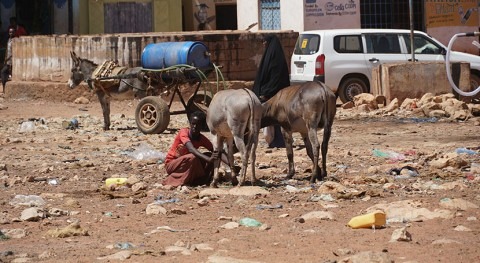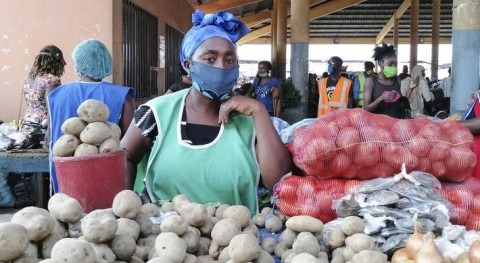The best ways of tackling the problem of water scarcity and shortages, as well as frequent, widespread and catastrophic floods, issues that affect more than 5 billion people worldwide, took centre stage at the 43rd session of the FAO Ministerial Conference this week with a series of high-level roundtables.
More than 3 billion people live in agricultural areas with high - or very high - levels of water shortages or scarcity, and it is estimated that by 2050, 57 percent of the global population will live in areas that suffer from water scarcity for at least one month each year.
The increased pressure on water resources and water stress can deepen already severely unequal access to water, increasing existing social disparities, particularly affecting vulnerable groups such as women, small-scale farmers, and Indigenous Peoples.
With agriculture accounting for the consumption of 70% of the world's freshwater resources, agrifood systems are therefore central to addressing the water scarcity challenge we are facing.
The first roundtable, entitled Water Scarcity: Making water flow for people and planet, took place on Monday, and was opened by the newly re-elected Director-General of the Food and Agriculture Organization of the United Nations (FAO), QU Dongyu.
In his opening remarks, the FAO Director-General noted that while there may not be simple solutions to complex problems, there are “smart choices” to be made. He invited the panel to focus their discussions on three areas of action: better governance, more integrated water resources, and more investments.
The roundtable, which was moderated by FAO Chief Economist Maximo Torero Cullen, also saw contributions from a High-level Ministerial Panel that included representatives from Brazil, Cabo Verde, China, Jordan, the Netherlands, Tajikistan, and the United States of America.
Among the attendees, the representative from Namibia, which is highly impacted by the climate crisis, said the main message from the debate was the need to “act now.” Gambia’s representative noted that the issue disproportionately affects women, who play a leading role in the country’s agricultural sector, while Argentina’s representative pointed to the difficulties involved in finding global solutions when countries have different types of governance within their national borders.
Torero concluded the roundtable by noting that while every country has its own way of doing things, FAO’s job is to bring best practices based on science and innovation.
Flood management
Tuesday’s roundtable was entitled Integrated Flood Risk Management. Floods have affected more than 2 billion people worldwide over the past decades and caused global losses worth around $20 billion in 2021. In Africa, over 2 000 people died last year alone in floods that hit around a dozen countries. In Pakistan, that same year, a flood put one third of the country under water, leading to 8 million displaced persons and more than 1 700 lives lost - one third of them children.
Director-General Qu kickstarted the debate by calling for the need to work “with natural water processes, rather than against them.”
FAO’s job is to bring best practices based on science and innovation
He gave the example of Viet Nam, where trash fish caught in the flood season were used as feeds for cultured fish, enhancing their food security. This kind of example encourages us to “rethink agricultural flood management in an integrated and holistic way,” he said.
FAO has produced a Technical Report on Integrated Flood Risk Management, which finds that the main points of good flood risk management include managing and reducing exposure to flood hazards; reducing vulnerability and building coping capacity; reducing flood impacts on those exposed; and managing flood risks through better governance.
Government ministers from several countries, including Finland, Thailand and Zimbabwe, took to the floor to share their experiences during the roundtable, which was moderated by FAO Deputy Director-General Maria Helena Semedo.
South Africa’s Minister for Agriculture, Land Reform and Rural Development, Angela Thoko Didiza, stressed the importance of civic education, early warning systems and rural and urban planning. Her counterpart from Yemen, Minister for Agriculture, Irrigation and Fish Wealth Salem Abdullah Eissa Salem Al-Socatri, where floods are expected in the coming weeks, noted the limited availability of early warning systems in his country. Zimbabwe’s Minister for Lands, Agriculture, Fisheries, Water and Rural Development, Anxious Jongwe Masuka, said his country was working on spreading better alerts to the population, while Jaana Husu-Kallio, Permanent Secretary at the Ministry of Agriculture and Forestry of Finland, one of the most digitally advanced countries in the world, said her country was in the process of piloting digital flood management plans.
Finally, the panel discussion saw contributions from, among others, Italy, which shared its experience of the floods that recently devastated its region of Emilia Romagna.
In thanking the panel, Semedo reminded the audience of how anticipatory action makes more economic sense than intervening once disaster has struck.
Water infrastructure
Wednesday’s roundtable on Water Infrastructure provided FAO Members with an opportunity to build a shared understanding of the importance of water infrastructure in achieving the Sustainable Development Goals, share their experiences, needs and challenges in developing and managing water infrastructures, and discuss strategies, financing, investment and governance of water infrastructure for meeting current and future needs and adapting to climate change.
Reliable water supply infrastructure enables farmers to diversify their agricultural practices and crop varieties and increase resilience. Effective water storage infrastructure can help manage water resources during periods of excess and scarcity, and enables farmers to cultivate crops throughout the year, mitigating the impact of seasonal variations and climate hazards.
Director-General Qu opened the discussions with a speech in which he underlined how agrifood systems and rural development depend on water infrastructure, which is becoming even more critical in addressing the impacts of the climate crisis.
With water infrastructure critical to efforts to make agrifood systems more efficient, inclusive, resilient and sustainable, “we need to invest in infrastructure that is better suited to the water challenges we face today,” Qu said.
Qu gave the example of the Sahel, where FAO is providing mechanization opportunities to farmers to improve their water infrastructure and is supporting rural women and their households to access water.
Another example comes from Sri Lanka and Zambia, where FAO is piloting multifunctional paddy fields for fish and shrimp farming, in addition to rice production. Such value-added infrastructure generates benefits by recharging groundwater, controlling floods and providing ecosystem services.
The roundtable also saw contributions from, among others, Manuel Villalobos Arámbula from the Secretariat of Agriculture and Rural Development of Mexico, Mathieu Eric Rokosse-Kamot, Minister for Agriculture and Rural Development of the Central African Republic and Avi Dicter, Minister for Agriculture and Rural Development of Israel.




